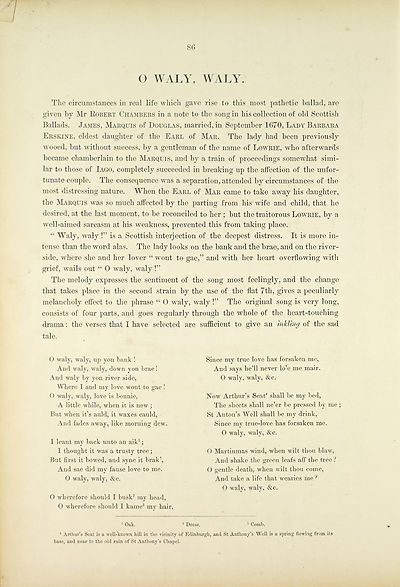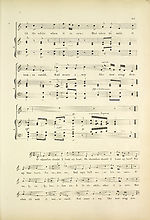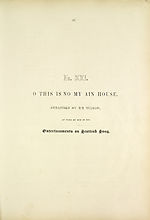Glen Collection of printed music > Printed music > Wilson's edition of the songs of Scotland
(42) Page 86
Download files
Complete book:
Individual page:
Thumbnail gallery: Grid view | List view

O WALY, WALY.
The circumstances in real life which gave rise to this most pathetic ballad, are
given by Mr Robert Chambers in a note to the song in his collection of old Scottish
Ballads. James, Marquis of Douglas, married, in September 1670, Lady Barbara
Erskine, eldest daughter of the Earl of Mar. The lady had been previously
wooed, but without success, by a gentleman of the name of Lowrie, who afterwards
became chamberlain to the Marquis, and by a train of proceedings somewhat simi¬
lar to those of Iago, completely succeeded in breaking up the affection of the unfor¬
tunate couple. The consequence was a separation, attended by circumstances of the
most distressing nature. When the Earl of Mar came to take away his daughter,
the Marquis was so much affected by the parting from his wife and child, that he
desired, at the last moment, to be reconciled to her ; but the traitorous Lowrie, by a
well-aimed sarcasm at his weakness, prevented this from taking place.
<e Waly, waly !” is a Scottish interjection of the deepest distress. It is more in¬
tense than the word alas. The lady looks on the bank and the brae, and on the river¬
side, where she and her lover “ wont to gae,” and with her heart overflowing with
grief, wails out “ 0 waly, waly!”
The melody expresses the sentiment of the song most feelingly, and the change
that takes place in the second strain by the use of the flat 7th, gives a peculiarly
melancholy effect to the phrase “ 0 waly, waly !” The original song is very long,
consists of four parts, and goes regularly through the whole of the heart-touching
drama: the verses that I have selected are sufficient to give an inkling of the sad
tale.
0 waly, waly, up yon bank !
And waly, waly, down yon brae!
And waly by yon river side,
Where I and my love wont to gae !
0 waly, waly, love is bonnie,
A little while, when it is new;
But when it’s auld, it waxeg. cauld,
And fades away, like morning dew.
1 leant my back unto an aik1;
I thought it was a trusty tree;
But first it bowed, and syne it brak’,
And sae did my fause love to me.
0 waly, waly, &c.
0 wherefore should I busk2 my head,
0 wherefore should I kame3 my hair,
Since my true love has forsaken me,
And says he’ll never lo’e me mair.
O waly, waly, &c.
Now Arthur’s Seat4 shall be my bed.
The sheets shall ne’er be pressed by me;
St Anton’s Well shall be my drink,
Since my true-love has forsaken me.
O waly, waly, &c.
0 Martinmas wind, when wilt thou blaw,
And shake the green leafs aff the tree ?
0 gentle death, when wilt thou come,
And take a life that wearies me I
0 waly, waly, &c.
1 Oak. 2 Dress. 3 Comb.
4 Arthur’s Seat is a well-known hill in the vicinity of Edinburgh, and St Anthony’s Well is a spring flowing from its
base, and near to the old ruin of St Anthony’s Chapel.
The circumstances in real life which gave rise to this most pathetic ballad, are
given by Mr Robert Chambers in a note to the song in his collection of old Scottish
Ballads. James, Marquis of Douglas, married, in September 1670, Lady Barbara
Erskine, eldest daughter of the Earl of Mar. The lady had been previously
wooed, but without success, by a gentleman of the name of Lowrie, who afterwards
became chamberlain to the Marquis, and by a train of proceedings somewhat simi¬
lar to those of Iago, completely succeeded in breaking up the affection of the unfor¬
tunate couple. The consequence was a separation, attended by circumstances of the
most distressing nature. When the Earl of Mar came to take away his daughter,
the Marquis was so much affected by the parting from his wife and child, that he
desired, at the last moment, to be reconciled to her ; but the traitorous Lowrie, by a
well-aimed sarcasm at his weakness, prevented this from taking place.
<e Waly, waly !” is a Scottish interjection of the deepest distress. It is more in¬
tense than the word alas. The lady looks on the bank and the brae, and on the river¬
side, where she and her lover “ wont to gae,” and with her heart overflowing with
grief, wails out “ 0 waly, waly!”
The melody expresses the sentiment of the song most feelingly, and the change
that takes place in the second strain by the use of the flat 7th, gives a peculiarly
melancholy effect to the phrase “ 0 waly, waly !” The original song is very long,
consists of four parts, and goes regularly through the whole of the heart-touching
drama: the verses that I have selected are sufficient to give an inkling of the sad
tale.
0 waly, waly, up yon bank !
And waly, waly, down yon brae!
And waly by yon river side,
Where I and my love wont to gae !
0 waly, waly, love is bonnie,
A little while, when it is new;
But when it’s auld, it waxeg. cauld,
And fades away, like morning dew.
1 leant my back unto an aik1;
I thought it was a trusty tree;
But first it bowed, and syne it brak’,
And sae did my fause love to me.
0 waly, waly, &c.
0 wherefore should I busk2 my head,
0 wherefore should I kame3 my hair,
Since my true love has forsaken me,
And says he’ll never lo’e me mair.
O waly, waly, &c.
Now Arthur’s Seat4 shall be my bed.
The sheets shall ne’er be pressed by me;
St Anton’s Well shall be my drink,
Since my true-love has forsaken me.
O waly, waly, &c.
0 Martinmas wind, when wilt thou blaw,
And shake the green leafs aff the tree ?
0 gentle death, when wilt thou come,
And take a life that wearies me I
0 waly, waly, &c.
1 Oak. 2 Dress. 3 Comb.
4 Arthur’s Seat is a well-known hill in the vicinity of Edinburgh, and St Anthony’s Well is a spring flowing from its
base, and near to the old ruin of St Anthony’s Chapel.
Set display mode to: Large image | Zoom image | Transcription
Images and transcriptions on this page, including medium image downloads, may be used under the Creative Commons Attribution 4.0 International Licence unless otherwise stated. ![]()
| Special collections of printed music > Glen Collection of printed music > Printed music > Wilson's edition of the songs of Scotland > (42) Page 86 |
|---|
| Permanent URL | https://digital.nls.uk/120438994 |
|---|
| Description | Scottish songs and music of the 18th and early 19th centuries, including music for the Highland bagpipe. These are selected items from the collection of John Glen (1833 to 1904). Also includes a few manuscripts, some treatises, and other books on the subject. |
|---|
| Description | The Glen Collection and the Inglis Collection represent mainly 18th and 19th century Scottish music, including Scottish songs. The collections of Berlioz and Verdi collected by bibliographer Cecil Hopkinson contain contemporary and later editions of the works of the two composers Berlioz and Verdi. |
|---|

